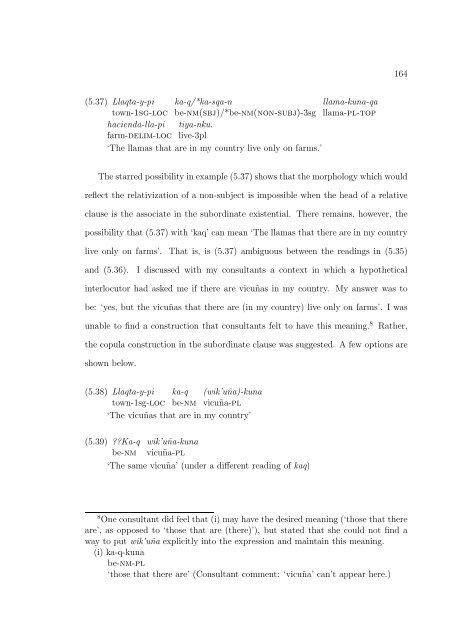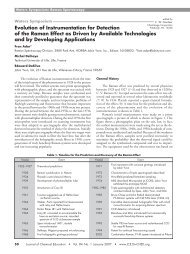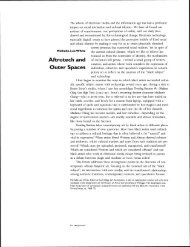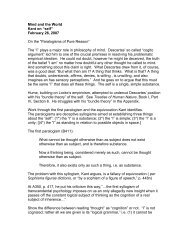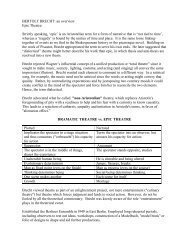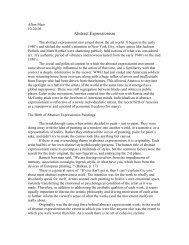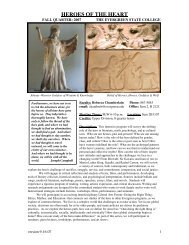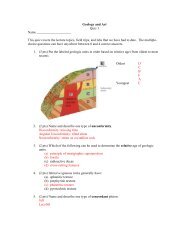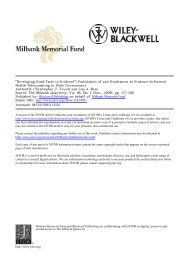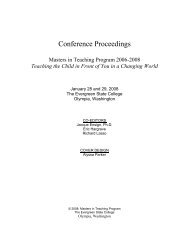the syntax and semantics of relativization and quantification
the syntax and semantics of relativization and quantification
the syntax and semantics of relativization and quantification
Create successful ePaper yourself
Turn your PDF publications into a flip-book with our unique Google optimized e-Paper software.
164<br />
(5.37) Llaqta-y-pi ka-q/*ka-sqa-n<br />
llama-kuna-qa<br />
town-1sg-loc be-nm(sbj)/*be-nm(non-subj)-3sg llama-pl-top<br />
hacienda-lla-pi tiya-nku.<br />
farm-delim-loc live-3pl<br />
‘The llamas that are in my country live only on farms.’<br />
The starred possibility in example (5.37) shows that <strong>the</strong> morphology which would<br />
reflect <strong>the</strong> <strong>relativization</strong> <strong>of</strong> a non-subject is impossible when <strong>the</strong> head <strong>of</strong> a relative<br />
clause is <strong>the</strong> associate in <strong>the</strong> subordinate existential. There remains, however, <strong>the</strong><br />
possibility that (5.37) with ‘kaq’ can mean ‘The llamas that <strong>the</strong>re are in my country<br />
live only on farms’. That is, is (5.37) ambiguous between <strong>the</strong> readings in (5.35)<br />
<strong>and</strong> (5.36). I discussed with my consultants a context in which a hypo<strong>the</strong>tical<br />
interlocutor had asked me if <strong>the</strong>re are vicuñas in my country. My answer was to<br />
be: ‘yes, but <strong>the</strong> vicuñas that <strong>the</strong>re are (in my country) live only on farms’. I was<br />
unable to find a construction that consultants felt to have this meaning. 8 Ra<strong>the</strong>r,<br />
<strong>the</strong> copula construction in <strong>the</strong> subordinate clause was suggested. A few options are<br />
shown below.<br />
(5.38) Llaqta-y-pi ka-q (wik’uña)-kuna<br />
town-1sg-loc be-nm vicuña-pl<br />
‘The vicuñas that are in my country’<br />
(5.39) ??Ka-q<br />
be-nm<br />
wik’uña-kuna<br />
vicuña-pl<br />
‘The same vicuña’ (under a different reading <strong>of</strong> kaq)<br />
8 One consultant did feel that (i) may have <strong>the</strong> desired meaning (‘those that <strong>the</strong>re<br />
are’, as opposed to ‘those that are (<strong>the</strong>re)’), but stated that she could not find a<br />
way to put wik’uña explicitly into <strong>the</strong> expression <strong>and</strong> maintain this meaning.<br />
(i) ka-q-kuna<br />
be-nm-pl<br />
‘those that <strong>the</strong>re are’ (Consultant comment: ‘vicuña’ can’t appear here.)


